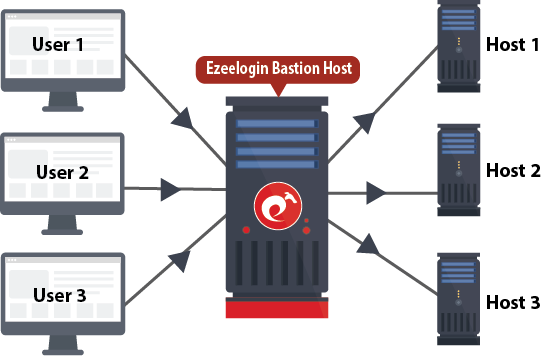
SSH Bastion Host
In recent times, there is an increasing need for organizations to give employees access to their IT facilities due to the ongoing Covid restrictions ( such as work from home ) in place and in other cases grant access to external parties like clients, vendors who want to troubleshoot and fix issues with the IT Infrastructure remotely. More so, is the need for multiple manage SSH access to the company’s Linux servers, Routers, Switches, while meeting regulatory and security compliance. This need led to the emergence of the SSH Bastion host concept.
What is an SSH Bastion Host?
An SSH Bastion host is simply a single, hardened server that you “jump” through in order to access other servers or devices on the inner network.
Sometimes called a SSH Jump host , or SSH Jump Server, SSH Gateway or a relay host, it’s simply a server that all of your users can log into and use as a relay server to connect to other Linux servers, Routers, Switches and more. Therefore, a SSH bastion host is a server inside a secure zone, which can be accessed from a less secure zone. It is then possible to jump from this host to greater security zones.
In other words, it is an intermediary host or an SSH gateway to a remote network, through which a connection can be made to another host in a dissimilar security zone, for example a demilitarized zone (DMZ2). In short, it is intended to breach the gap between two security zones. This is done with the purpose of establishing a gateway to access something inside of the security zone, from the DMZ.
The SSH bastion host bridges two dissimilar security zones and offers controlled and monitored access between them.
For users accessing your secure network over the internet, the Bastion host provides a highly secured and monitored environment especially when it spans a private network and a DMZ with servers providing services to users on the internet.
Furthermore, a classic scenario is connecting from your desktop or laptop from inside your company’s internal network, which is highly secured with firewalls to a DMZ. In order to easily manage a server in a DMZ, you may access it via a bastion host.
Therefore, a bastion host is a server inside a secure zone, which can be accessed from a less secure zone. It is then possible to jump from this host to greater security zones. An example would be a high security zone inside a corporation. The policy guide states that this zone cannot be accessed directly from a normal user zone. Hence, in a DMZ off the firewall protecting this zone you have a jump host.
Connections are permitted to the ssh bastion host from the user zone, and access to the secure zone are permitted from the bastion host.
More often, there is a separate authentication method for the bastion host fortified with multi factor authentication, Single Sign On ( SSO ) , Radius, & more.
How does SSH with bastion work?
It is a secure intermediary server where all your system administrators would login in first via SSH before getting to access the remote devices such as Linux instance, Routers, Switches etc. The purpose of having the SSH bastion host is to improve security and consolidate SSH user activities to a single point hence better security and accountability. SSH bastion host is also known by the name SSH Jump Box, SSH Jump Host & SSH Gateway.
How to Setup an SSH Bastion Host?
-
Bastion using OpenSSH
A basic SSH bastion host server with limited features and functionalities can be configured using OpenSSH packages that are available by default on most Linux distributions.
How do I connect to bastion ssh or how to proxy an SSH connection to the remote server?
In the example below, we will just use the basic SSH command line to proxy an SSH connection to the remote server via an intermediate jump server.
ssh -J bastion_host remote_machine
If the -J option is not available use the -W option to pivot the connection through an intermediate bastion host.
ssh -o ProxyCommand="ssh -W %h:%p bastion.gateway.org" remote.server.org
You can also use an SSH client configuration file, instead of passing arguments via SSH.
Edit the ~/.ssh/config file :
Host <nickname>
HostName <hostname_of_remote_server>
User <user_on_remote_server>
ProxyCommand ssh <user_on_remote_server>@<bastion_host> nc %h %p</bastion_host></user_on_remote_server></user_on_remote_server></hostname_of_remote_server></nickname>
<nickname> : Sets nickname for the target/remote server
<hostname_of_remote_sever> : Sets the real remote server/host name
<user_on_remote_server> : Real user who exists on target server
<bastion_host>: IP or the hostname` of the proxy server
%h will be the host name to connect
%p will be the port
Now you can SSH to the target/remote machine:
ssh -v remote_serverip
Proxy jump via one or more gateways using proxyjump
To navigate through intermediate jump hosts with OpenSSH 7.3, utilize the ProxyJump directive in your ssh_config files.
Host server2
HostName 192.168.0.177
ProxyJump user@jump-server1.test.com:22
User devops
You can define multiple jump hosts by listing them as a comma-separated sequence.
Host server3
HostName 192.168.0.177
ProxyJump user@jump-server1.test.com:22, user@jump-server2.test.com:22
User devops
Do refer to the article SSH Proxy and SSH Bastion Host for configuring a basic bastion host server that is very limited in feature and functionality when compared to the modern day ssh jump host solutions.
2. Bastion Host using Ezeelogin
Ezeelogin is a much more powerful and advanced SSH bastion host software and can be deployed quickly on a Linux server. It has powerful features that makes managing hundreds of Linux devices and granting ssh access to these devices a piece of cake. Do refer to the article to setup and configure a ssh bastion host quickly on your premise or on cloud.
Why do you need an SSH Bastion Host solution to manage ssh access?
The OpenSSH based bastion host server is clearly not enough to meet the modern day requirements of an IT enterprise. The challenges for the enterprise are constantly changing and dynamic . It could be from maintaining security, granting ssh access to the users to designated server and that too for particular time and on another day it could be the security compliances that needs to be met at the time of a Linux servers infrastructure audit.
The modern day SSH bastion host solutions are designed to address the challenges faced by an IT enterprise when it comes to security and to meet various security compliances like PCI DSS, NIST, ISO 27001 and more.
Important features of Ezeelogin SSH Jump server
- Identity and Access management (IAM)Privileged Access management (PAM)
- Role Based Access Control to delegate access to Linux servers and Network devices
- Two factor authentication methods like Google Authenticator, DUO Security, Yubikey, FIDO etc in SSH
- Integrates with Windows Active Directory, OpenLDAP, Redhat IDM
- Supports SAML for Single Sign On
- Support RADIUS Authentication to access network devices such as Routers and Switches
- Password Manager
- SSH key rotation
- Automated root password management
Importance of SSH bastion host?
- Improved Security
- Centralized Access
- Streamlined Access Management
- Maintain access logs
- Compliance with Security Standards
How do I secure my SSH bastion host?
To ensure maximum protection of your bastion host, you should focus on the process of server security hardening. In simple terms, that means applying a combination of basic and advanced security measures to address vulnerabilities in your bastion host server and operating system to boost overall server security.
Find how to secure your ssh bastion host here.
CONCLUSION
IT Enterprises that use a SSH Bastion host solution in improving security of their critical IT asset and in meeting various mandatory security compliances (which would otherwise prove very costly in case of a breach), are more likely to succeed due to the improved operational efficiency, digital security, hence more successful business for the company’s end customers.
- Tags:
- ssh bastion host






